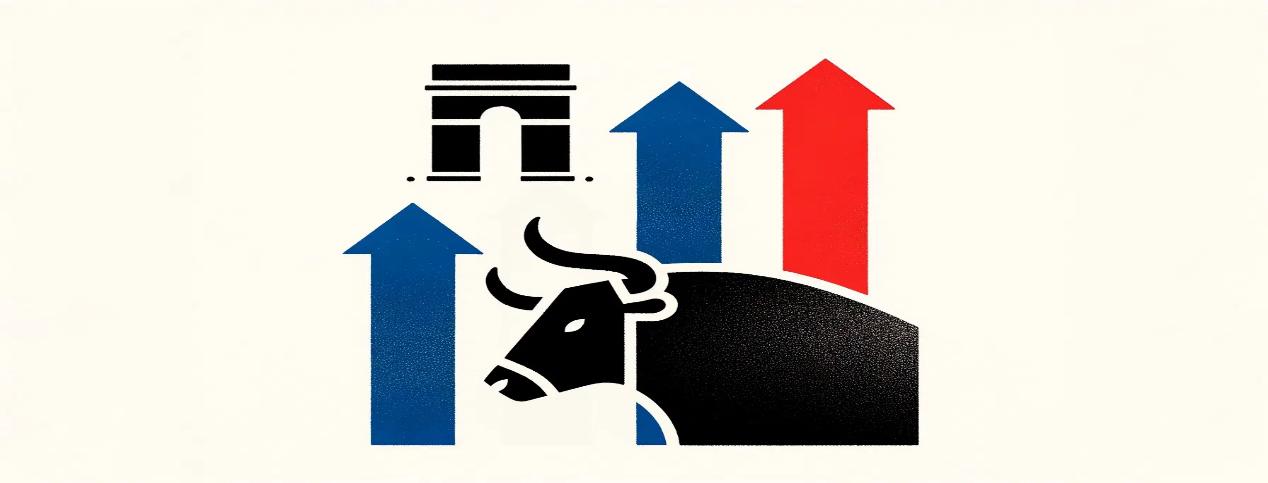
On July 1, 2024, after the first round of French parliamentary elections ended, European stock markets rose, led by French bank stocks. The premium requirements of investors for holding French bonds are dropping sharply, because the extreme right wing won the first round of elections, which to some extent alleviated the uncertainty of investors.
Firstly, the French CAC 40 index surged 2.6%, driving regional stock markets up as the market reacted positively to the election results. The stock prices of French banks such as BNP Paribas, Societe Generale, and Credit Agricole rose 4.8% to 7.9%, driven by election optimism and favorable debt restructuring agreements. As of 0709 Greenwich Mean Time, the Stoxx 600 index rose 1%, rebounding from four consecutive trading days of decline. This rise is driven by speculation that the National Alliance Party may not be able to obtain an absolute majority, reflecting a mentality of "buying rumors and selling facts". A senior analyst at Ruixun Bank pointed out that the market response has been severely affected by speculation about the election results.
Secondly, there are indications that the far right wing of France is unable to win enough seats in legislative elections to gain an absolute majority, leading to a rise in European stock markets. In the bond market, the premium required for investors to hold French government bonds has fallen from its highest level in 12 years. Investors hope that neither the far left nor the far right are likely to launch large-scale spending policies that could harm France's fiscal situation at will now. Investors are more concerned about the significant impact of political events on market dynamics. The recent rise indicates significant market changes triggered by elections and political developments. The rise in French banking stocks highlights the potential benefits of election results for specific industries, even in broader economic uncertainty.
In addition, driven by the strengthening of the euro and increased risk appetite after the first round of French parliamentary elections, the Central European currencies rose significantly on Monday. The results of the French election boosted market sentiment, with the Hungarian forint and Polish zloty appreciating significantly. The Hungarian forint rose 0.4% to a three week high of 393.1 to 1 euro, while the Polish zloty rose 0.34% to trade at 4.295 to 1 euro. Millennium Bank analysts attribute this to the strong upward trend in the Eurodollar market driven by minimizing investor uncertainty. At the same time, the Czech krone has lagged behind, stabilizing at 25.01 to 1 euro, which may make it vulnerable to future political tensions due to the recent interest rate cut by the Czech National Bank.
The renewed interest of investors in the Central European currency indicates an increase in investor confidence, while the strengthening of the euro after the French election boosted this confidence. Hungary, Poland, and other regions have all experienced currency appreciation, reflecting increased market stability. It is worth noting that the stock market indices in Prague and Warsaw have risen, indicating that the overall health of the market is good. However, Hungary, the Czech Republic, and Poland reported a contraction in manufacturing activity, highlighting the subtle economic conditions that investors should closely monitor.
Overall, the results of the French parliamentary elections not only led to a surge in the euro, but also sparked a wave of positive sentiment affecting the currencies of Central Europe. Although the stability of the Czech krone after interest rate cuts suggests potential fragility, the widespread rise in the region indicates a correlation between the economic and political landscape. Investors should pay attention to any changes in European political dynamics that may affect currency and market stability. This rebound highlights the interdependence of the European market and the broader impact of national politics on regional economic health. Due to the failure of the National Front to obtain an absolute majority, some speculate that market friendly policies may prevail, thereby easing investors' concerns about the new French government's fiscal discipline.

According to Bloomberg, a recent in-depth interview with Michael Dehal, senior portfolio manager at Raymond James' Dehal Investment Partnership, was released, focusing on the economic development prospects and potential risks of Canada and the United States in 2026.
According to Bloomberg, a recent in-depth interview with Mi…
TikTok Shop, the global e-commerce platform under ByteDance…
As a severe flu outbreak sweeps across the United States, w…
Recently, US Treasury Secretary Mnuchin publicly stated tha…
At the dawn of 2026, the United States launched a military …
From the stiff step when it first debuted in 2022 to demons…